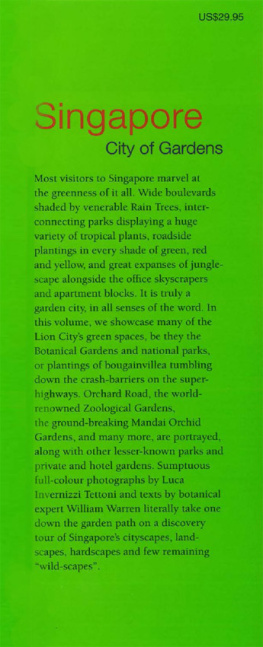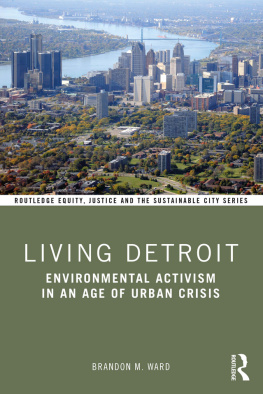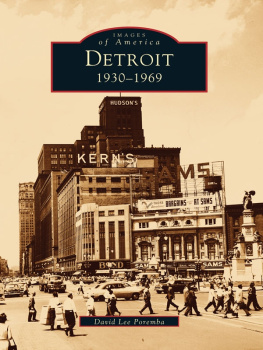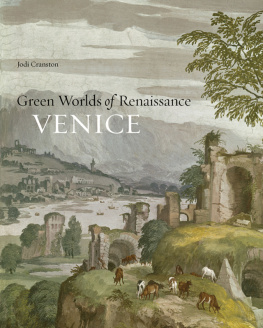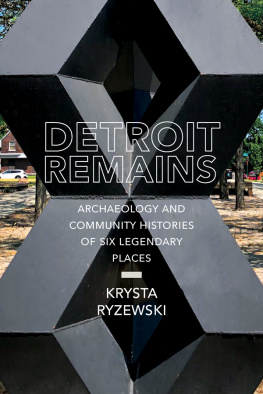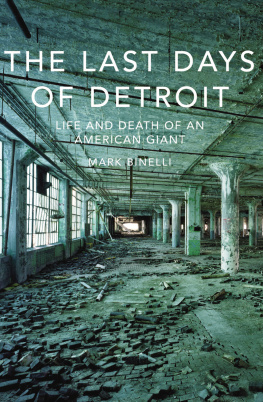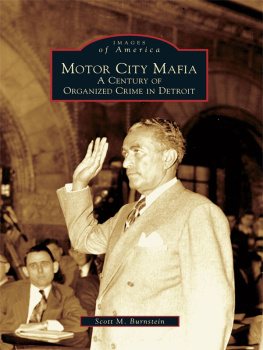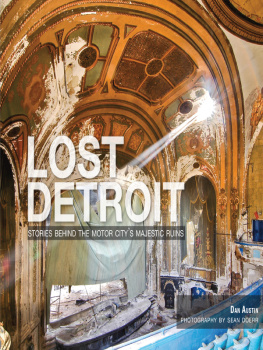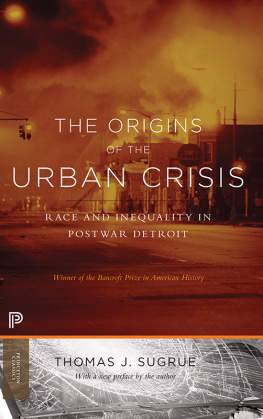Published by the University of Pittsburgh Press, Pittsburgh, Pa., 15260
Copyright 2020, University of Pittsburgh Press
All rights reserved
Manufactured in the United States of America
Printed on acid-free paper
10 9 8 7 6 5 4 3 2 1
Cataloging-in-Publication data is available from the Library of Congress
ISBN 13: 978-0-8229-4572-7
ISBN 10: 0-8229-4572-X
Cover art: (top) Map of potato patch plots (from Agricultural Committee Report, 1894) overlaid on a map of Detroit (from Rand, McNally, and Companys Indexed Atlas of the World, 1897); (bottom) Recycled tires used in organic vegetable farm, PhanuwatNandee/iStock.
Cover design: Joel W. Coggins
ISBN-13: 978-0-8229-8702-4 (electronic)
ACKNOWLEDGMENTS
So many people, conversations, colleagues, friends, and places have helped shape this book that it is hard to know where to begin. I am thankful to have had the opportunity to learn and receive feedback from an outstanding group of scholars and mentors at the University of Michigan. Philip Deloria, Kristin Hass, Matthew Lassiter, and David Michener all shaped this project in formative ways. As teachers, scholars, and practitioners they are exceptional and I cannot thank them enough for their guidance and mentoring. Kristin was particularly gracious with her time and read drafts and consulted with me on myriad issues related to transforming my research into a book. In addition to being a thoughtful outside reader, David always helped me keep my professional and personal values in balance.
Sandy Crooms at the University of Pittsburgh Press reached out to me after I presented about a portion of this work at the 2014 meeting of the American Society for Environmental History in San Francisco. Her enthusiasm, encouragement, and patience helped me keep momentum when I felt I was running on emptyand well after I had chosen a career path where writing a book was not a requirement. I am also grateful to the entire team of talented editors, designers, and staff at the University of Pittsburgh Press who have been so helpful in strengthening and shepherding my work through the publication process.
The anonymous reviewers for my manuscript were both thoughtful and knowledgeable. Their comments, criticism, and intelligent engagement with the early manuscript helped improve its content, focus, and writing significantly. Thank you for the time you put into your written comments, which helped me clarify my arguments and make the text stronger than it otherwise would have been.
To all of my friends and family near and far, I cannot express my gratitude. Although you may not realize it, your good humor and willingness to stay connected and plan fun things give me energy and so much joy. To all of you, thank you. In particular, Michelle McClellan shared some sound advice she received from Alexandra Lord that also came at the right moment for me. Holly Rapp read several versions of nearly all the chapters. Stephen Wards urban and community studies class at the University of Michigans Residential College helped begin my interest in learning about Detroit. I was fortunate to take this class with Brian Peck, who continues to show me new places in the city. To all those colleagues I have served with on panels and had conversations with at conferences for the American Society for Environmental History, Urban History Association, and American Studies Association, American Public Gardens Association, New England American Studies Association, National Council on Public History, and other meetings I attended, thank you. Your work and your ideas are an inspiration and helped develop my own. Several faculty and colleagues I overlapped with at the University of Michigan helped shape this research, my approach to scholarship, and this manuscript in its very early stages as a dissertation: Rabia Belt, Francis Blouin, Matthew Briones, Jesse Carr, Tyler Cornelius, Matthew Countryman, Julie Ellison, Margot Finn, William Glover, Aston Gonzalez, Sarah Gothie, Liz Harmon, June Howard, Frank Kelderman, Natalie Lira, Pascal Massinon, Hannah Noel, Alex Olson, Susan Parrish, Kush Patel, Ray Silverman, Ronit Stahl, Bradley Taylor, Michael Witgen, Magdalena Zaborowska, and Claire Zimmerman. Thank you for your teaching, advice, encouragement, friendship, and collegiality.
A fellowship at Smithsonian Gardens Archives of American Gardens helped me complete my research and writing. I continue to be grateful for the mentorship of Cynthia Brown whose passion for community gardening and urban revitalization kept my energy going. Conversations with Joyce Connolly, Kelly Crawford, Barbara Faust, and Paula Healy helped expand my knowledge of garden history and design. A workshop at the Smithsonian National Museum of American History also helped improve early versions of this research, especially conversations with Pete Daniel, Terre Ryan, Jeffery Stine, and Amrys Williams.
The staff at the libraries and archives I visited have been truly outstanding. At the University of Michigan I am particularly grateful to those at the Bentley Historical Library, Clark Map Library, and Hatcher Graduate Library. I benefited from the expertise of staff at the Reuther Library at Wayne State University, the Library of Congress, the National Archives, the US Department of Agriculture Library, the Archives of American Gardens, Archives of American Art, and Smithsonian Institution Libraries. The staff at the Burton Historical Collection at the Detroit Public Library, especially Mark Bowden and Dawn Eurich, were generous with their time; they do a lot of good work with limited resources. At the Olmsted National Historic Site, T. Michele Clark and Michael Dosch helped me locate images and drawings. I would like to thank Jim Pershing, superintendent at the Huron-Clinton Metropolitan Parks, who, after a cold contact from a curious graduate student, allowed me access to the HCMAs archives and collection of scrapbooks, kept since the organizations founding.
My closest family and loved ones have lived with this project as long as I have. To my dad, I owe my love of cities and the built environment. Kate Silbert knew what to say at the right moments, graciously and patiently offering feedback that improved my writing and kept me grounded in what mattered most through peaceful walks and fun adventures. My brother, Chris, always knows how to make me laugh and enjoy the silly moments in life when they matter most. To my mom, I owe my sense of curiosity about things large and small in the world. And without her love, support, and encouragement to keep going, none of this would have been possible. This book is for you.




